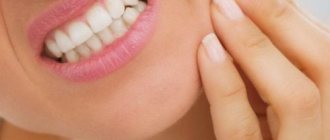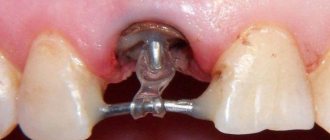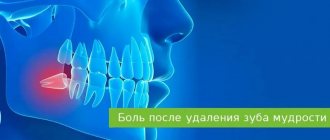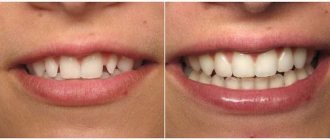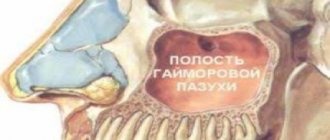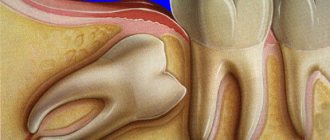Visiting the dentist is a very unpleasant experience. Having headaches after visiting the dental office is a common occurrence. If a doctor removes or prescribes treatment for a diseased tooth, a headache may occur.
The reasons for this may be the following:
- Side effect from medications;
- Severe dental disease;
- Poor oral health;
- A large number of teeth undergoing treatment;
- Poor condition of the body as a whole, the presence of chronic diseases;
- Senile age of the patient;
Most often, pain caused by the cessation of the painkiller goes away on its own. If the pain only gets worse, you need to take an analgesic and consult a specialist for advice.
One of the possible causes of headaches may be the removal of a diseased tooth. Headaches occur especially often when a wisdom tooth is removed (the procedure is not always simple). This type of operation tends to damage bone tissue and gums, which leads to pain.
When correcting a malocclusion, headaches often appear. Pain can be of various types:
- Pain in the ear area;
- The occurrence of pain in the temporal part of the head;
- The occurrence of pain in the occipital part;
If you follow clear treatment instructions, this type of headache goes away in a short time.
Headaches after using anesthesia
Very often, dentists use local anesthesia when treating teeth. After undergoing anesthesia, many patients experience headaches. There are several reasons for this type of pain:
- Presence of intolerance to anesthesia or incorrect choice of medication;
- Location of the diseased tooth in remote places;
Most often, the headache is aching in nature and tends to increase when moving the head.
If headaches began after the extraction of a diseased tooth, it is necessary to find the cause of the pain; it may be a complication of the operation.
When is the choice between sedation and local anesthesia in favor of sedation?
The doctor’s task is to show the patient, explain to him that everything can be done under local anesthesia, work with him and prepare him for this. There are patients who want to do everything faster, but they still feel afraid, do not want to take risks and, accordingly, ask that all treatment be carried out under sedation. Therefore, in the clinics of the German Implantology Center, we carry out manipulations on therapeutic, implantological and orthopedic treatment, also under sedation, when our patients come from cities in Europe, North America, Asia and we, accordingly, have a limited period of time for the patient’s stay in Moscow.
Therefore, we provide sedation to such tourist patients every visit as part of their one-time visit to Moscow, but we carry out a large amount of work with them.
Can you be allergic to sedation?
On the topic of allergic reactions, can you be allergic to sedation? An allergy, most likely, may occur not to sedation, but to the drugs used for sedation. When preparing for sedation, it is necessary to undergo tests, the patient must meet with an anesthesiologist-reanimatologist, collect a complete medical history of the patient, his body characteristics. And here it is important that the patient also conveys the information to the doctor as much as possible and without hiding or concealing anything. And, of course, the tests should be carried out in proven certified laboratories so that everything is clear, clear, and understandable without any distortion of the data, so that the doctor can also bear full responsibility for the patient’s treatment.
Recovery after sedation
How is the patient’s rehabilitation and recovery carried out after sedation at the German Implantology Center? Each patient’s reaction may be different: some recover from sedation a little slower, others come to their senses a little faster. Within about half an hour or an hour, the patient fully regains consciousness, but he still remains for some time in the Research Center clinic under the supervision of an anesthesiologist-resuscitator. Next, a taxi is called for the patient, which takes him directly to his home, or, if the patient comes with his relatives, then, naturally, his relatives take him home.
Recovery after local anesthesia
There are special drugs that can quickly remove the feeling of anesthesia, but if the patient has had a large volume of medical work, then this should not be done, because the volume of interventions was large, and the effect of the local anesthetic can reduce the possible pain effect that can be caused by the volume work. Therefore, the patient is given a package of medical support, the drugs of which are recommended to be used for 2-3 days to a week, depending on the volume and number of manipulations performed. Dental treatment under local anesthesia is one thing, and complex operations under local anesthesia associated with bone grafting and implantation are another. Although it is worth noting that local anesthesia in surgery is now a rarity, it is being successfully replaced by sedation.
Headache due to complications arising after dental intervention
Many patients experience headaches after visiting the dentist. Various factors can contribute to the appearance of pain symptoms:
- The appearance of complications that manifested themselves during dental treatment;
- Intolerance and allergic reactions to the use of drugs;
- Contraindications to tooth extraction;
- The appearance of a specific odor in the place of dental treatment;
- The presence of inflammation of the tissues of the oral cavity;
- The presence of swelling of the oral tissues;
Most often, pain occurs in several places. They begin in the jaw and gradually spread throughout the head. Painful sensations can be either sharp or aching. Complications after going to the dentist may depend on the presence of certain diseases in the patient:
- Very often, pain appears in patients suffering from diabetes. The headache may last for a long time;
- Ear disease, which can progress during dental treatment and cause headaches;
- Delay in contacting a specialist, which results in severe diseases of the teeth and gums, which are accompanied by painful symptoms of the head;
After symptoms of complications occur, you must go to the hospital to prescribe effective treatment. The occurrence of headaches may be due to the progression of certain dental diseases. Such as:
- Periodontitis – aching pain occurs in the temporal parts of the head;
- Alveolitis - severe pain occurs that begins in the jaw area;
Back pain
Due to improper functioning of the masticatory muscles, a headache may occur, and the bite may change due to incorrect posture. If there are any disturbances in the correct position of the spinal column, the respiratory system will compensate for them by moving the neck back and turning it. Moreover, the connection between bite and posture works in both directions. That is, an incorrect bite can also cause changes in posture. With an incorrect bite, the first and second cervical vertebrae do not align correctly relative to each other. The body, in attempts to compensate for all this, leads to other disorders. Because of this, in particular, back pain can begin.
Headaches after dental implantation
Pain may occur during the recovery period and after dental implantation surgery. Patients usually experience headaches for several days after surgery. The cause of pain is inflammatory processes in the tissues surrounding the implant. For severe pain, the doctor will prescribe a painkiller. If the pain does not go away within five days, you should contact a specialist who will check the implants for surgical complications and prescribe appropriate treatment.
I had a tooth removed and my head hurts: what should I do?
As a rule, tooth extraction is a last resort, which dentists undertake only after all other treatment options have failed to produce the desired results. This procedure is directly related to surgery, which is traumatic for the oral cavity. Therefore, it is not surprising that after a tooth has been removed, your head, ear, gums hurt and you feel a general malaise. However, it is necessary to distinguish those cases when the headache is a consequence of a reaction to damage to bone tissue and gums caused during surgery, from painful sensations signaling post-operative complications.
A tooth has been removed and you have a headache: who is to blame and what to do?
There may be several reasons for headaches after tooth extraction. Here are the most common ones:
- The result of side effects of medications.
- Postoperative condition of the oral cavity.
If the reason that a tooth was removed and your head hurts is precisely the problems listed above, then you should not be afraid of such pain. As a rule, it occurs immediately after the anesthesia wears off and does not last long, subsiding within a few hours, or a maximum of a day. If you are sure that this is your option, we advise you to be patient a little and everything will go away by itself.
Do not take painkillers without the advice of your dentist! After all, they can affect the clinical picture and complicate the timely detection of complications after surgery. Let's move on to just this option: the tooth has been removed, quite a lot of time has passed, and the headache does not subside. You need to be aware that most likely this is not an ordinary migraine, which can be relieved with pills, but a signal from your body that something went wrong after the operation. Of course, maybe this is an individual reaction of your body, or a disease not at all related to tooth extraction. But it is best to seek advice from the dentist who performed the operation, and he will be able to answer your question about why you have a headache after tooth extraction.
Well, the symptoms after which you should definitely make an appointment with a doctor are the occurrence of a headache a few days after the operation. If such pain radiates to the ear, and is also accompanied by an unpleasant odor and taste in the mouth, this may mean that the healing process of the tooth socket is proceeding with complications, and only a professional can help you.
You can get a consultation at the DENTISTRY clinic. Make an appointment by calling +7 (8342) 308–088 or using the form below.
Make an appointment
Treatment methods for headaches after dental surgery
If you have a headache for a long time, your dentist will prescribe treatment using the following medications:
- Anti-inflammatory drugs - help relieve inflammation;
- Analgesics – eliminate pain;
- Antispasmodics – relieve spasms that cause pain;
If the cause of pain is inflammatory processes in the oral cavity, then the presence of toxins, which are eliminated by the use of antibiotics, should initially be eliminated, and only then the prescribed medications should be used.
Taking such medications must be done under the supervision of a physician. The use of such drugs is contraindicated for patients suffering from stomach diseases.
Indications for treatment under anesthesia
- Dentophobia/stomatophobia (panic fear of dentistry in both children and adults);
- Very low pain threshold;
- Strongly expressed gag reflex;
- Individual intolerance to drugs included in local anesthesia, allergic reactions;
- Mental abnormalities that exclude the possibility of contact between the doctor and the patient, when the patient is unable to adequately respond to the doctor’s actions;
- A large amount of work, or a very long treatment time;
Relieving pain with folk remedies
If you experience headaches after a recent visit to the dentist, you must first identify the cause of the disease. It is impossible to do this on your own without visiting a doctor. You can use some traditional medicines, but you should consult your doctor before using them.
- Drinking mint tea is good for eliminating cramps and reducing headaches;
- Freshly prepared viburnum juice - drink one hundred grams for headaches twice a day for five days;
- The use of hot foot baths is a proven folk method for relieving headaches;
You should know that the occurrence of headaches after dental treatment may be one of the first prerequisites for the occurrence of more dangerous diseases.
Painful sensations mean that inflammatory processes are occurring in the body, so you need to consult a specialist; you should not self-medicate. Moscow metro station Zvezdnaya, Danube Avenue, 23
Basic Concepts
Plate dentures
Removable structures include plate and clasp dentures.
Plate dentures, in turn, are partial removable and complete removable.
Partial removable laminar dentures are used when one or more teeth are missing.
Complete removable plate dentures are indicated in the absence of teeth in the upper and/or lower jaw.
A partial denture is a partial removable denture consisting of artificial teeth, artificial gums and special fastening elements (hooks, locks).
Why can complications arise after the installation of removable dentures?
- Poor preparation for prosthetics. Before treatment, it is necessary to carry out sanitation of the oral cavity, restoration, and more often, prosthetics of teeth, which will serve as a support for fixing the prosthesis;
- Insufficient oral hygiene. Can lead to inflammation of the gums under the prosthesis, the formation of caries, pulpitis of the teeth that serve as support for the prosthesis;
- Fracture of the prosthesis. As a result of breakage or displacement of parts of the prosthesis, its fixation in the oral cavity is disrupted, discomfort and pain occur when wearing it;
- Inaccurately manufactured prosthesis. The design should be easily fixed and also removed without much effort. There should be no gaps in the oral cavity between the structure and the gum, but the prosthesis should not put pressure or rub soft tissues. In the first case, food debris will accumulate in the gap, in the second, sores will appear on the mucous membrane, and subsequently bedsores;
- Changes in the position of individual teeth and bite, leading to displacement of the prosthesis.
Types of reactions to pain [1, 2]
The way a patient feels pain depends on many reasons. The main ones are:
- the intensity of the factor that caused the pain and the body’s reaction to it;
- psycho-emotional state of the patient.
The first is a sensitive reaction to pain. When a dentist performs any manipulation, sensitive receptors are turned on and a cascade of reactions develops from the endocrine system, parts of the central nervous system, and the brain. The patient is aware, feels pain and “gives” appropriate reactions to it.
The second point is reactions that depend on the psycho-emotional component, on the data of the volitional sphere. A person experiences fear, anxiety, nervousness, and physical and motor manifestations in the form of screaming, crying, and defensive actions. The pulse and breathing become more frequent, profuse sweat is released, the mouth becomes dry, the regulation of vascular tone is disrupted, and subsequently blood pressure increases or decreases.
The fight against pain in dentistry is necessary not only to eliminate pain for the sake of the effectiveness and comfort of therapy. This is also important because pain, its anticipation, as well as the consequences of a painful intervention cause severe stress, which affects the state of the body and affects further adherence to treatment.
For what procedures is anesthesia used [1, 2]
Pain relief in dentistry cannot be overemphasized. So that the patient does not experience discomfort, and the specialist has the opportunity to perform the entire necessary amount of treatment, anesthesia is used for almost all dental interventions. The types of anesthesia in dentistry are varied, and the doctor chooses the method of anesthesia depending on the upcoming procedure.
Modern ideal anesthetic in dentistry:
- Affects as few organs or processes as possible.
- Poorly absorbed.
- Does not have an irritating effect.
- Works quickly, deeply, long lasting.
Based on materials from “Local anesthesia and anesthesiology in dentistry: a textbook”, Ph.D. Krazhan S. N.
Application or superficial local anesthesia in dentistry is carried out using a spray or gel with an anesthetic component. The drug is applied to the mucous membrane and acts quickly, but not for long.
- Before the anesthetic injection
- For treating mucous membranes during stomatitis, suppuration, gingivitis
- When performing professional hygiene
- During crown fitting
Infiltration anesthesia is the administration of an anesthetic using a syringe before therapy. Lasts about 1 hour.
- Treatment of caries, pulpitis
- Root canal treatment
- Removal of nerves
Conduction anesthesia is an injection of an anesthetic drug near a nerve. This “freezing” lasts about 2 hours.
- Treatment of pulpitis , complicated caries, including multi-rooted teeth
- Opening of granulomas, cysts
- extraction (removal)


